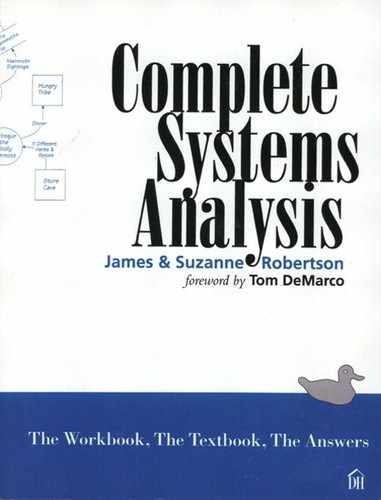Foreword
The past decade has been one of striking change for the discipline of systems analysis. As recently as the mid-1980s, analysts everywhere were still inclined to dictate to their users what the new system would be like. They typically passed down their pronouncements in the form of a written specification. Today, that approach will no longer fly anywhere. Today, we analysts find ourselves serving not so much as inventors of the new system but as catalysts for the invention process. Instead of text, we rely on models of all kinds: function models, data models, object schemas, state models, prototypes, GUI frameworks, and the like.
At the key interface between analyst and user, the dialogue has changed, too. Before, we tended to say, “Here’s what you’re getting.” Now, we show one of the models and ask, “How about something like this?” Once a model is on the table, the process comes alive. The users get their hands on the model and start to reshape and remold. “Close,” they say. “If only we could change it, though, to something like this ...” When that begins to happen, I know the project is on track.
When we first show users a model, we know it is, at best, close to what is required. We show it specifically to elicit change. As such, the model isn’t supposed to be an exact replica of the system, but rather an example of the kind of system we’ll probably be building. Modern analysis is, accordingly, a “by-example” discipline. We show examples at each and every stage of the process.
In Complete Systems Analysis, Suzanne and James Robertson have hit upon the charming idea of guiding you through this by-example discipline with a by-example presentation. From the very first page, an extraordinary and wonderful page, you will know this book is fundamentally different from any other analysis texts you may encounter. It doesn’t lecture at you, it doesn’t take up your time telling you anything you already knew. It’s a book that you don’t exactly read at all; instead, you sort of ski through it, along a path of your own choice. (Well, they’ll explain all about that.)
When my own analysis book was still in manuscript, the publisher sent it out for evaluation to a number of referees. Among the comments that came back to me from this process was the following one: “I guess you can’t really like this book unless you’re willing to like the author.” Since that particular referee had never shown herself to be “willing to like the author,” I knew the comment was supposed to be a criticism. But I felt just the opposite. I felt it was the nicest possible compliment. After all, I wasn’t trying to hide behind the page, to make myself anonymous. The books I had most admired in our field (Fred Brooks’s The Mythical Man-Month, for example, or virtually any of Jerry Weinberg’s works) were personal and personally revealing and more meaningful because of it. That was the kind of book I had been trying to write.
Complete Systems Analysis is similarly personal. You’ll come to know its authors, Suzanne and James Robertson, as you read through their work. I predict you’ll find them (like the book itself) to be honest and on-target and funny and inventive and curmudgeonly and wise ... but, most of all, honest. There is something of their own lives and professional experience on every page. The work they share with you is a real one, based on their extensive involvement in automation within the British television industry, as well as numerous other organizations. The lessons they drew from that project at the time and redraw for you now are not simplistic—there are no easy answers in systems analysis—but they are useful lessons. They help you to discover some of what is the most useful, more or less the way they discovered it themselves. You will probably make a few of the same mistakes they made in the discovery process, and if you can profit from making those mistakes in the safe environment of these pages instead of in your own work, the benefits should be obvious.
October 1993
Camden, Maine
Tom DeMarco
